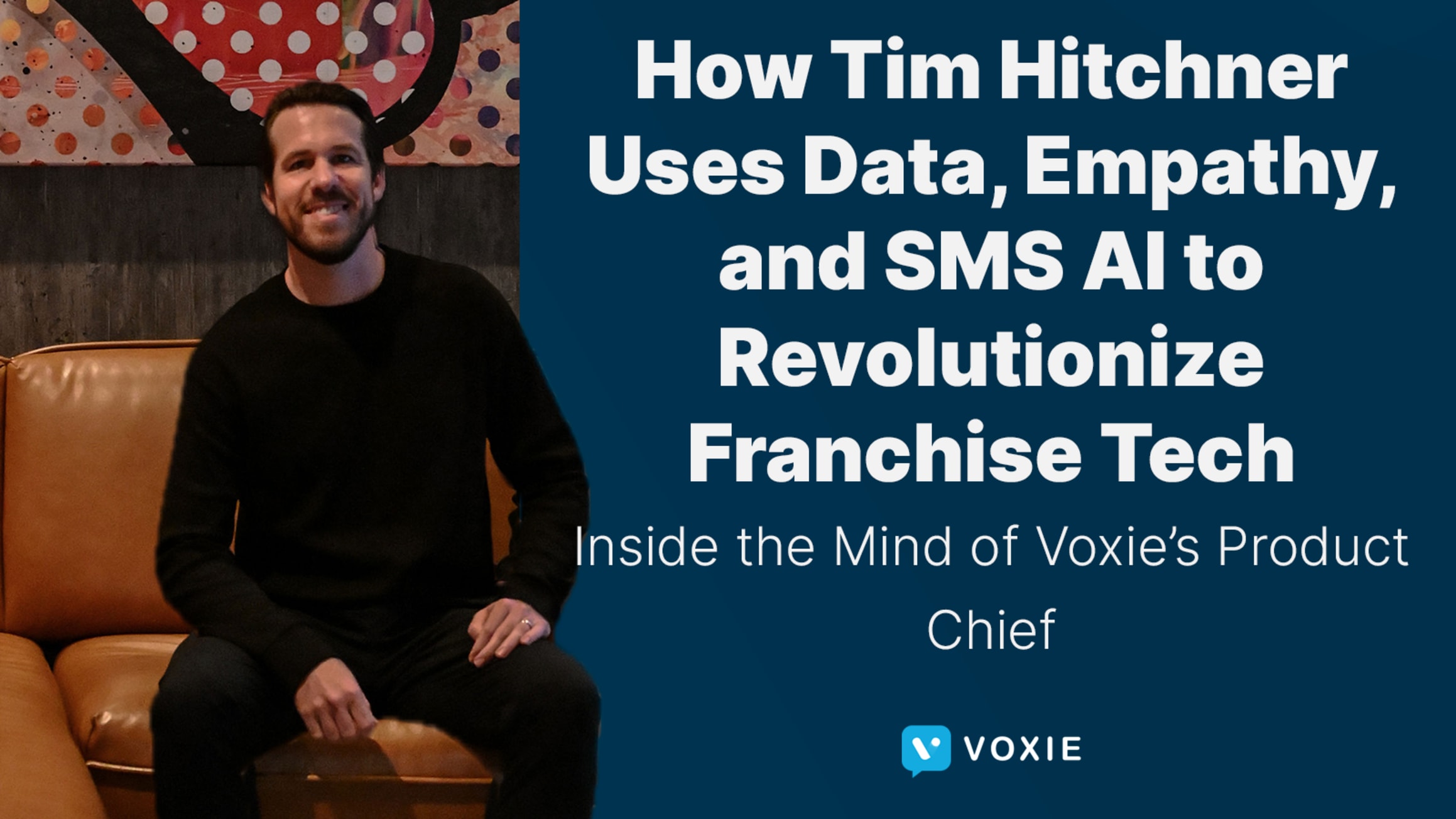When Tim Hitchner talks about product, he doesn’t start with software. He starts with people.
“My journey has always centered around improving the product,” he says, “even when I wasn’t officially in a product role. I just kept moving closer to the core — figuring out what people really need, and how to make sure what we’re building actually solves their problems.”
Now VP of Product at Voxie, Hitchner is doing just that. The Atlanta-based SMS platform — purpose-built for franchises — is growing fast, and at its helm is a leader who’s spent more than a decade navigating the full customer lifecycle. From consulting and customer success to solution engineering and onboarding, Hitchner has quietly accumulated a rare 360-degree perspective — and he’s now applying it where it matters most: product strategy.
From Consulting to Conversion
Hitchner began his career at Athenahealth, where he worked with healthcare organizations to optimize workflows in the wake of new electronic documentation regulations. It was a time when physicians were adjusting to unfamiliar systems — and struggling to maintain patient volume.
“If you could save four minutes per visit on documentation,” Hitchner explains, “that meant doctors could see more patients, make more money, and run a healthier business. That was the first time I saw how big an impact you could have by fixing small inefficiencies.”
That detail-oriented, systems-first mindset became a hallmark of Hitchner’s approach. Later, at Patientco — a healthcare startup focused on digital billing — he transitioned into customer success and analytics, and had his first encounter with the potential of text messaging.
“We sent a bill by text, and five minutes later, it was paid,” he says. “I remember thinking, ‘Okay, this changes everything.’ That was the moment I understood texting wasn’t just a communication channel — it was a revenue engine.”
Building a Product Career in Reverse
Most product leaders rise up through engineering or design. Hitchner, however, took a different route — working backward from the post-sale experience to pre-sale strategy, before stepping into product.
“When I was Customer Success Manager, I saw firsthand what causes customer frustration after signing,” he says. “I’ve experienced the friction caused by product gaps during onboarding, and in solution engineering, I learned exactly what customers need in order to realize value. All of those experiences influence how we build our product today—because I’ve been the one answering the tough calls when expectations weren’t met, and seen how quickly trust erodes when you don’t deliver on what was promised.”
It’s an unconventional path, but one that uniquely equips him to solve the challenges Voxie is tackling. His deep understanding of the customer journey—across solution design, onboarding, and support—gives him a clear view into what both franchisees and corporate teams need from a messaging platform.
“Franchisees need tools that work out of the box and move the needle for their business, and corporate needs the ability to add guardrails that protect the brand voice, ensure compliance, and control spend,” Hitchner says. “Solving for that tension is at the heart of everything we’re building.”
Putting the Product to the Test
For Hitchner, building product isn’t just about shipping features — it’s about proving they create real results.
He gets deeply involved in analyzing the impact of Voxie’s product — not just to report results, but to pressure-test them. Rather than relying on basic ROI metrics, he looks at baseline customer behavior to understand what’s truly driving incremental revenue — separating the impact of marketing efforts from what would have happened organically.
It’s an approach grounded in empathy for customers who are often skeptical of marketing attribution, and it’s a mindset that reflects how he leads product at Voxie: not just building tools, but building confidence that those tools drive measurable growth.
Keeping His Eye on What’s Next
Hitchner is always on the lookout for ways AI can drive real value — not just hype.
“At Voxie, we’ve already leveraged AI for content generation, auto-responders, and conversational sentiment analysis,” he says. “But where I think AI can make the biggest difference for franchise brands is in analytics.”
With thousands of locations often running their own local SMS campaigns, AI can help surface patterns and insights that would be impossible to spot manually. From categorizing campaigns by use case, to benchmarking performance across locations, to identifying top performers — AI becomes a force multiplier for learning and optimization across the network.
He’s also keeping an eye on the steady evolution of SMS into RCS (Rich Communication Services), especially as U.S. carriers increase their support.
“We’re not a WhatsApp country,” he says. “SMS isn’t going anywhere — but it is getting smarter. Brands are going to keep investing in it, and we’re focused on helping them get more value from every message.”
Leading with Empathy — and Experience
For all his talk of metrics and strategy, Hitchner keeps returning to something less quantifiable: empathy.
“Each role in my career has taught me something about the people on the other side of the room or screen,” he says. “The doctor who just wants to see more patients. The health system trying to accelerate revenue. The franchise brand who’s juggling ten things and needs a text campaign to just work. My job now is to build products that make their lives easier.”
It’s a product philosophy grounded in firsthand experience — and the kind of leadership that doesn’t just think about the user, but understands them.
To hear more from Tim, firsthand, read
Overcoming SMS Challenges for Franchise Service Brands
and
